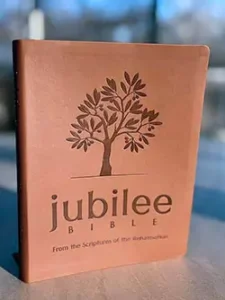The Jubilee Bible
From the Scriptures of the Reformation
The Jubilee Bible is based on the scholarship of the early Reformation.
The Jubilee Bible is translated in such a way that each unique Hebrew word is matched to a unique English word (within the possibilities and limitations of the English language).
For example, in many English Bibles there are two very different Hebrew words (though not the only) that are both translated as salvation. In the Jubilee Bible these two different words are separated as the early reformers gave precedent. One word describes salvation as an accomplished fact; the other as an ongoing process. The translation as an ongoing process is the meaning of the word health in Hebrew (William Tyndale is the one that coined saving health for the English translation).
As a principle, the Jubilee Bible matches the Hebrew with the Greek using places where the Lord Jesus and the apostles quoted Scripture in the New Testament as the guide. This is because the New Testament writers were thinking Hebrew even as they wrote in Greek. Therefore many commentaries that use the Pagan meanings of the Greek, as the primary meaning, are confusing and do not track with the Hebrew. In New Testament Greek the Hebrew meanings are prime and the pagan meanings are secondary.
Casiodoro de Reina translated consistently, as salud (Spanish word for health), the unique word that I mentioned above. For the English, I chose to go with the saving health rendition of Tyndale because our word health in English is not as comprehensive as the word salud in Spanish. Since the Jubilee translation renders the same thing the same way consistently, the value of how God is using the word will be established clearly in the narrative of the first half of the Old Testament.
Then, once the meaning and value is clearly set, the last half of the Old Testament (the part having to do extensively with prophecy) is what is quoted the most in the New Testament. Once we are able to see where the New Testament quotes the Old Testament (which is much more extensive than is apparent in many English translations), it allows us to see which Hebrew words match the Greek words selected by the inspired writers of the New Testament.
Even if you do not agree with the choice of English words in the Jubilee translation, due to the fact that the translation is consistent, you can study where the word is introduced and see how God uses each unique word through the scope of the entire Bible (first usage and last usage are important) and see beyond any shadow of a doubt what meaning God has assigned to the original word. This will free you from the spin (intentional or unintentional) that occurs frequently with Bible Dictionaries produced by modern scholars.
The vast majority of the terminology in the Jubilee Bible begins in the Old Testament.
The terminology develops through the prophetic books (which are quoted profusely in the New Testament allowing translators to make the right match between the Hebrew key word and its Greek counterpart. We have used the scholarship of the early Reformation in the light of two or three witnesses. The translation of Hebrews 6:4–6 is one such example in respect to the English word backslidden.
For it is impossible that those who once received the light and tasted of that heavenly gift and were made partakers of the Holy Spirit and likewise have tasted the good word of God and the virtue of the age to come, and have backslidden, be renewed again by repentance, crucifying again for themselves the Son of God and putting him to an open shame. (Hebrews 6:4–6)
Here is some of the trajectory the through the Old Testament as the word backslide is introduced and developed by God.
The backslider in heart shall be filled with his own ways, and the good man shall be separated from him. (Proverbs 14:14)
Therefore a lion out of the forrest shall slay them, and a wolf of the desert shall destroy them and a tiger shall lie in wait over their cities; anyone that goes out from there shall be torn in pieces because their rebellions have been multiplied, and their backslidings are increased. (Jeremiah 5:6)
How long wilt thou wander, O thou backsliding daughter? for the LORD will bring forth a new thing upon the earth, A woman shall compass the man. (Jeremiah 31:22)
Why gloriest thou in the valleys? Thy valley has slipped, O backsliding daughter that trusted in her treasures, she that saith, Who shall come against me? (Jeremiah 49:4)
The Old testament use of this word, backsliding, comes with serious warnings to Israel and to Ammon (meaning, of the people) and also holds out hope for restoration after going through severe chastisement.
The Greek usage in Hebrews 6 is also a serious warning that those who blatantly sin with their eyes wide open cannot be renewed by simple repentance. They will definitely suffer serious consequences. It is summed up in the next verses:
For the earth which drinks in the rain that comes often upon it and brings forth herbs in season for those by whom it is dressed receives blessings from God; but that which bears thorns and briers is rejected and is near unto cursing whose end shall be by fire. (Hebrews 6:7–8)
This means that those backsliders who receive the discipline and correction of the Lord will be blessed if this causes them to bring forth good fruit. Those who bring forth evil fruit thorns and briers are given yet another serious warning. Also, the literal Greek is quite graphic, giving yet another witness to why the early reformers chose this translation.
Greek has a conditional verb tense that we do not have in English.
The translation of Romans 11:26 is an example of where this comes into play, and as a result, the Jubilee Bible reads differently than other English translations. The Spanish language, in fact, does have this conditional tense, and Spanish translations like the 1602 Biblia del Cántaro and Francisco de Encinas in his 1534 New Testament agree with the work of Casiodoro de Reina in 1569. This is also true of some of the modern Spanish renditions of this verse.
And even if all Israel were saved, as it is written: There shall come out of Sion the Deliverer, and shall take away the ungodliness from Jacob; and this shall be my covenant unto them when I shall take away their sins. (Romans 11:26–27)
Since English does not have this conditional verb tense the Jubilee Bible translation is slightly clumsy having to couple the words, even if and were saved, to attempt to convey meaning into English that is built right into the verb in Greek and Spanish. Even so, I cannot think of a better way to express it, and not only here. I calculate that there are close to 33,000 promises in Scripture, and virtually all of them are flagged with a condition or a conditional verb because Hebrew also has a conditional verb tense.
Hebrew, Greek, and Spanish also have a command form, and Greek and Hebrew have an exclusive form, neither of which exist in English and which are used in thousands of verses.

Copyright © 2020
by Russell M. Stendal
All rights reserved.

ISBN: 978-1-64765-022-3
eBook ISBN: 978-1-64765-087-2